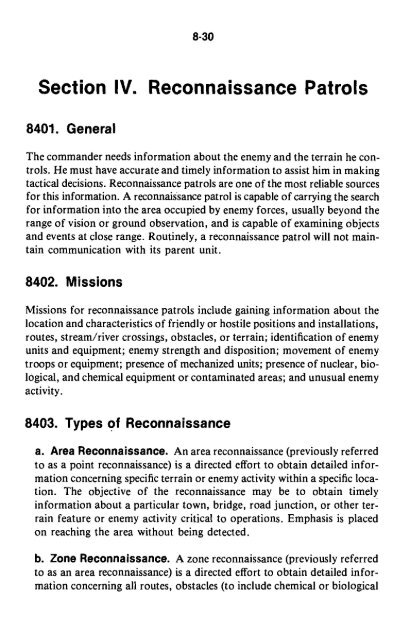- Page 1 and 2:
MCWP 3-11.2 w/Ch 1 Marine Rifle Squ
- Page 3 and 4:
1. PURPOSE DEPARTMENT OF THE NAVY H
- Page 5 and 6:
User Suggestion Fonn From: To: Comm
- Page 7:
Record of Changes Change No. Date o
- Page 10 and 11:
vUi Section IV. M203 Grenade Launch
- Page 12 and 13:
x 4504 Preparatory Phase for the Ni
- Page 14 and 15:
xii 8305 Security 8-21 8306 Movemen
- Page 16 and 17:
xiv Appendixes: Index A Military Sy
- Page 18 and 19:
1.2 SGT ®®ØO ®®ØO L!CPL L!CPL
- Page 20 and 21:
1.4 (f) Cartridge, 40 mm, multiple
- Page 22 and 23:
1-6 1006. Fire Support for the Squa
- Page 24 and 25:
2.2 Section II. Range Determination
- Page 26 and 27:
2-4 2203. Five-Degree Method Iftime
- Page 28 and 29:
2-6 Section III. Rifle and Automati
- Page 30 and 31:
2-8 caused by slight variations in
- Page 32 and 33:
2.10 (3) Enfilade Fire. Fire delive
- Page 34 and 35:
2-12 b. Sustained Rate. This term a
- Page 36 and 37:
2.14 positions are prepared which p
- Page 38 and 39:
2.16 Although the pointing techniqu
- Page 40 and 41:
2-18 BLUFF OR HORIZON OR SKYLINE Fi
- Page 42 and 43:
2-20 c. Reference Points (1) To hel
- Page 44 and 45:
2.22 b. The squad leader also uses
- Page 46 and 47:
2.24 b. In this example, the squad
- Page 48 and 49:
2.26 Section VI. Application of Fir
- Page 50 and 51:
2.28 ___ ___I 302 202 102 Figure 2.
- Page 52 and 53:
2.30 . .'.' S ___ ___I 302 202 0d2
- Page 54 and 55:
2.32 (a) Riflemen and Assistant Aut
- Page 56 and 57:
2.34 RIFLE LEFT LIMIT STAKE RIGHT L
- Page 59 and 60:
Chapter 3 Combat Formations and Sig
- Page 61 and 62:
NOTE: THE POSITION OF THE FIRE TEAM
- Page 63 and 64:
ECHELON LEFT ECHELON RIGHT Figure 3
- Page 65 and 66:
(d) Vulnerable to fire from the fro
- Page 67 and 68:
0 0 0 0 00 ' ' "___________ ' 302 1
- Page 69 and 70:
0 0 --- - 102 0 0 '-_________ 202 0
- Page 71 and 72:
BATTLE DRILL FIRE TEAM FORMATIONS C
- Page 73 and 74:
COLUMN TO SKIRMISHERS LEFT Figure 3
- Page 75 and 76:
COLUMN TO ECHELON LEFT Figure 312 e
- Page 77 and 78:
SKIRMISHERS RIGHT WEDGE TO SKIRMISH
- Page 79 and 80:
WEDGE TO ECHELON RIGHT Figure 3-12
- Page 81 and 82:
SKIRMISHERS RIGHT To COLUMN Figure
- Page 83 and 84:
WEDGE SKtRMISHERS RfGHT TO WEDGE Fi
- Page 85 and 86:
SKIRMISHERS RIGHT TO ECHELON RIGHT
- Page 87 and 88:
ECHELON RIGHT TO COLUMN Figure 3.12
- Page 89 and 90:
ECHELON LEFT TO WEDGE Figure 3.12 s
- Page 91:
ECHELON LEFT TO SKIRMISHERS LEFT Fi
- Page 94 and 95:
3.36 1. DECREASE SPEED. Extend the
- Page 96 and 97:
3.38 7. FIRE SLOWER. Execute slowly
- Page 98 and 99:
3.40 14. SHIFT. Point to individual
- Page 100 and 101:
3-42 20. SQUAD. Extend the hand and
- Page 102 and 103:
3-44 26. 1 DO NOT UNDERSTAND. Face
- Page 104 and 105:
3-46 32. DISREGARD PREVIOUS COMMAND
- Page 106 and 107:
348 b. Signals Used With Helicopter
- Page 108 and 109:
3.50 7. TO DIRECT THE HELICOPTER TO
- Page 111 and 112:
Chapter 4 Offensive Combat Section
- Page 113 and 114:
POINT (squad) ADVANCE GUARD (compan
- Page 115 and 116:
LEADING FIRE TEAM I 50.100 METERS I
- Page 117 and 118:
102 202 302 Figure 4-4. Individual
- Page 119 and 120:
0 0 0 0 0 REAR PARTY 50•100 METER
- Page 121 and 122:
(6) Flank Patrol (a) Rifle squads a
- Page 123 and 124:
SECTOR OF FIRE C AND OBSERVATION .
- Page 125 and 126:
(3) Execution. (It is here where th
- Page 127 and 128:
FINAL CL! FINAL I.' ASSAULT POSITIO
- Page 129 and 130:
(4) Scouting Fire Team (a) When a r
- Page 131 and 132:
4301. General Section III. Conduct
- Page 133 and 134:
fire teams function as directed. Th
- Page 135 and 136:
4303. Movement From the Assault Pos
- Page 137 and 138:
fires. The assault is started on or
- Page 139 and 140:
through the entire objective. Maint
- Page 141 and 142:
the hasty defense in an orderly fas
- Page 143 and 144:
Section IV. Exploitation Phase 4401
- Page 145 and 146:
LIMIT OF ADVANCE PROBABLE LINE OF D
- Page 147 and 148:
• Camouflaging individuals and eq
- Page 149 and 150:
4601. General Section VI. Infiltrat
- Page 151 and 152:
SQUAD INFILTRATION LANES ENEMY PATR
- Page 153 and 154:
Chapter 5 Defensive Combat Section
- Page 155 and 156:
(1) Lateral Limits. Readily identif
- Page 157 and 158:
LIMIT OF FIRE LIMIT OF FIRE Figure
- Page 159 and 160:
• Protect a crew-served weapon by
- Page 161 and 162:
supports them by fire. The fighting
- Page 163 and 164:
(2) Individual Fighting Position (a
- Page 165 and 166:
(9) Fire Plan Sketch. A sketchofthe
- Page 167 and 168:
St SUPPLEMENTARY POSITION •1 (ONL
- Page 169 and 170:
• Observe as much of the squad fi
- Page 171 and 172:
During his check of the fighting po
- Page 173 and 174:
• Posting security (listening pos
- Page 175 and 176:
(5) In heavy woods, complete cleari
- Page 177 and 178:
2 Grenade Sump. A circular grenade
- Page 179 and 180:
f. Constructing Obstacles. The squa
- Page 181 and 182: (Paragraph 2) "The mission of our s
- Page 183 and 184: a predetermined line, normally the
- Page 185 and 186: 5209. Local Security for Platoons a
- Page 187: . The location and composition of t
- Page 190 and 191: 6•2 C. Ensures squad area is in g
- Page 192 and 193: 64 (d) Mustering boat teams in asse
- Page 194 and 195: 6•6 (6) Helmet chin strap is loos
- Page 196 and 197: 6-8 and maintain control of members
- Page 198 and 199: 7.2 c. Landing Zone. A landing zone
- Page 200 and 201: 7.4 LOADING POINTS LWNG a' PICKUP Z
- Page 202 and 203: 7.6 (2) Conducts map and aerial pho
- Page 204 and 205: 8-2 (1) The reconnaissance unit rec
- Page 206 and 207: 8-4 Section II. Patrol Preparations
- Page 208 and 209: 8-6 8203. Patrol Leader's Preparati
- Page 210 and 211: 8.8 8206. Study the Terrain and Sit
- Page 212 and 213: 8-10 PATROL WARNING ORDER 1. A brie
- Page 214 and 215: 8-12 d. Logistic Support. The patro
- Page 216 and 217: 8.14 g. Signals. The patrol leader'
- Page 218 and 219: 816 4. ADMINISTRATION AND LOGISTICS
- Page 220 and 221: 8.18 Section III. Conduct of Patrol
- Page 222 and 223: 8.20 8303. Exercise of Control a. T
- Page 224 and 225: 8.22 points. Scouts are always empl
- Page 226 and 227: 8-24 (b) En Route Rally Points. The
- Page 228 and 229: 8.26 (2) A combat patrol's mission
- Page 230 and 231: 828 (b) When used offensively, the
- Page 234 and 235: 8-32 8406. Actions at the Objective
- Page 236 and 237: 8501. General 8-34 Section V. Comba
- Page 238 and 239: 8.36 (2) A patrol sent out to estab
- Page 240 and 241: 8.38 (1) The point ambush is one wh
- Page 242 and 243: 8.40 • Early warning of enemy app
- Page 244 and 245: 8.42 a. Task Organization and Equip
- Page 246 and 247: 8-44 d. Use of Radio and Other Mean
- Page 249 and 250: Chapter 9 Special Tactics and Techn
- Page 251 and 252: STONE BRICK THICK WALLS DEEPLY RECE
- Page 253 and 254: g. To a degree, walls and roofs of
- Page 255 and 256: a. Covering Party. The covering par
- Page 257 and 258: (d) The use of voice communications
- Page 259 and 260: g. CS grenades can be employed to r
- Page 261 and 262: (4) Covered Routes. These are used
- Page 263 and 264: Section II. Attack of Fortified Are
- Page 265 and 266: (1) Neutralize the enemy infantry o
- Page 267 and 268: e. Employment of Weapons by the Ass
- Page 269 and 270: • Surrounding field fortification
- Page 271 and 272: Section III. Tank-Infantry Coordina
- Page 273 and 274: ow Figure 9-3. Open Terrain. (2) Cl
- Page 275 and 276: c. Communications. Communications b
- Page 277 and 278: (1) Point Minefield. Point minefiel
- Page 279 and 280: (3) Electrical Detection. Electrica
- Page 281 and 282: (2) Blasting Caps (a) Nonelectric.
- Page 283 and 284:
12) Thermal Radiation and Other Bur
- Page 285 and 286:
drop flat on the ground or to the b
- Page 287 and 288:
(c) Blood Agents. Theseare rapid ac
- Page 289 and 290:
(c) Individual Chemical Agent Detec
- Page 291 and 292:
Section VI. Guerilla Operations 960
- Page 293 and 294:
• if fires are necessary, smokele
- Page 295 and 296:
d. Base Alert. The critical periods
- Page 297 and 298:
a. Purpose. The primarypurpose of o
- Page 299 and 300:
Appendix A Military Symbols 1. Gene
- Page 301 and 302:
5. Combining Basic Symbols a. The a
- Page 303:
9. Miscellaneous Symbols. Following
- Page 306 and 307:
B•2 ACTION BY SENTRY ACTION BY PE
- Page 308 and 309:
C-2 d. Complete Plan. Uponhis retur
- Page 310 and 311:
D.2 c. Terrain and Weather. The ter
- Page 313 and 314:
Appendix E Squad Five-Paragraph Ord
- Page 315 and 316:
Appendix F Reporting Information 1.
- Page 317:
Appendix G Handling Prisoners of Wa
- Page 320 and 321:
H-2 b. When the enemy approaches a
- Page 322 and 323:
H.4 5. Some things the enemy will l
- Page 324 and 325:
H-6 d. Shape is the outline of some
- Page 326 and 327:
H•8 b. Marines should camouflage
- Page 328 and 329:
H•1O g. Helmets must be covered w
- Page 330 and 331:
H.12 Figure H-13 Camouflage Sticks.
- Page 332 and 333:
CHANGE 1 1-2 NCO NSDAPL NSDATL OP P
- Page 335 and 336:
Index Paragraph Page A Ambushes: Cl
- Page 337 and 338:
Combat formations . 3101 3-1 Changi
- Page 339 and 340:
Defensive combat —Continued Fire
- Page 341 and 342:
Fire —Continued Rates 2605 2-34 A
- Page 343 and 344:
G Guerrilla operations 9601 9-43 At
- Page 345 and 346:
0 Offensive combat: Approach march
- Page 347 and 348:
Patrol conduct —Continued Exercis
- Page 349 and 350:
Duties Riflemen: .100Sf 1-5 Fire de
- Page 351:
w Weapons: Ammunition: M-16 rifle 1




